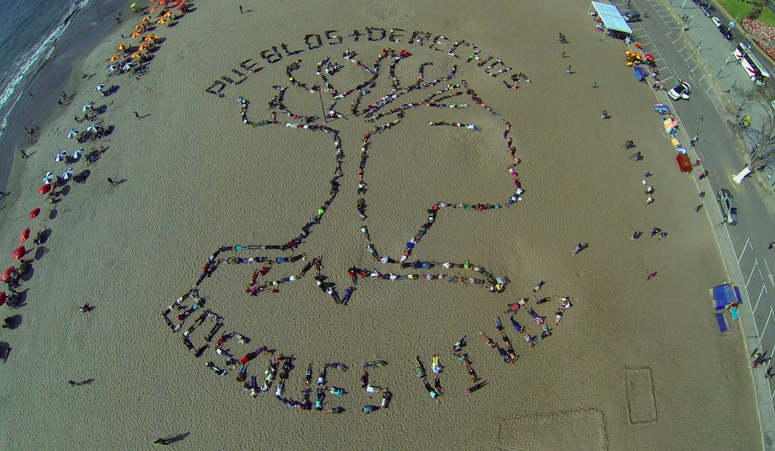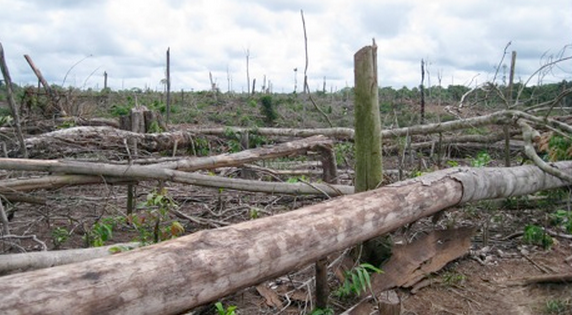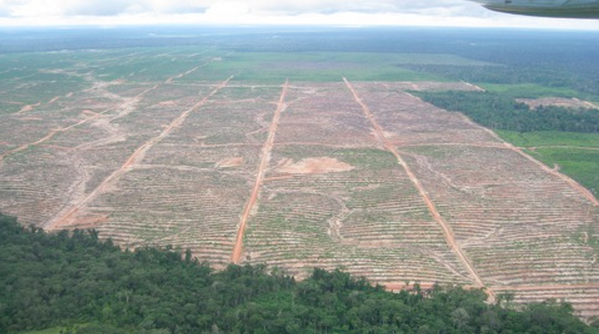
Indigenous Peoples + Territorial Rights = Living Forests! Hundreds of indigenous peoples and their allies to create a human banner parallel to the UN COP20 climate summit to demonstrate the importance of guaranteeing territorial rights in addressing climate change. ©Amazon Watch / Spectral Q — in Lima, Peru.
Political leaders from around the world and thousands of government officials, scientists and lobbyists are meeting this week in the Peruvian capital of Lima to discuss solutions for the global climate crisis. One of their priorities is the conservation of natural forests.
Forest ecosystems play an important role for the climate, water cycles and soil protection. Trees and soil store enormous amounts of carbon, and up to 20% of yearly greenhouse gas emissions are the result of deforestation.
But not far away from the UN climate summit in Lima, just across the Andes in the Peruvian Amazon region – the green lung of Earth – thousands of hectares of rainforest are being cleared with chainsaws and bulldozers. And in this particular instance, Peruvian government and state officials prefer to close their eyes and ears and remain silent.

The real world: logged rainforest near the town of Tamshiyacu in the Peruvian Amazon region
Source: RdR
According to Sociedad Peruana de Ecodesarrollo, two companies logged around 15,000 hectares of primary rainforest in recent months without an environmental impact assessment or permits for forest clearing or change of land use: around 13,000 hectares north of the town of Pucallpa in Ucayali, and about 2,000 hectares near Tamshiyacu in Loreto.
This is only the beginning. The same companies and others have applied for permits to log more than 106,000 hectares of mostly primary rainforest in the region of Loreto according to the newspaper El Comercio. Similar interests exist in Ucayali and San Martin. Their objectives: to cash in on timber and forest land and establish huge industrial palm oil and cacao monoculture plantations.
This is not only detrimental to nature and the livelihoods of forest-dependent communities, it also comes at a tremendous economic cost to Peru. A study on the valuation of environmental goods and services lost by deforestation in Tamshiyacu and Nueva Requena determined that the economic losses for the next 30 years amounted to US $348,000,000. In addition to being responsible for this economic impact, the companies are also reportedly intruding on the properties of local peasant farmers.
The current developments in the Peruvian Amazon are the consequence of misguided policies, weak governance, inadequate laws and the decentralization of competence to the regional governments. In 2000, the Peruvian government declared the establishment of palm oil plantations to be of “national interest” in an effort to attract major investors. In January, the Agricultural Ministry announced that Peru has room for 600,000 hectares of palm oil plantations.
The newspaper El Comercio reported that state officials, including the president of Ucayali, had allegedly sold state-owned forest lands to one of the companies in an irregular manner. The case was transferred to the National Criminal Court in Lima in July.

Aerial view of the deforestation for palm oil in Ucayali
Source: RdR
A variety of organizations and local citizens have filed charges against the companies for environmental crimes and the usurpation of private property. Several state prosecutors and courts in Loreto and Ucayali are investigating the cases. The investigations are extremely slow, however, and lack backing from public institutions.
In Loreto, the senior prosecutor for the environment in charge of investigating the deforestation in Tamshiyacu resigned in October. “Support for our prosecutor’s office is minimal, and without personal, administrative operators, we simply cannot do good work,” environmental prosecutor Manuel Medina told the press. “Everything has its limits. I have sent official letters to the Ministry of Justice asking for help, and I have had no response.”
In late October, the Peruvian Minister of Agriculture was called to inform before a congress committee on reported irregular logging and massive deforestation in Loreto (Tamshiyacu) and Ucayali on behalf of a private company to plant cacao and other products without prior environmental impact studies.
It is time for Peru’s president Ollanta Humala, the UN, and its member states to take action. The agreements and commitments made during the climate summit need to materialize, not only on paper, but also in the forests. A UN declaration on forests was signed during a previous UN climate conference in New York in September, and a forest partnership was established between Peru, Germany and Norway. The forests, and the people who depend on them, urgently need to see these promises put into action.
More information:
TV reports from Peruvian channel Panamericana:
– Deforestation without limits: forest devastation in Iquitos from the 10th of August, 2014
– Slash and burn in Ucayali: continued devastation of the Peruvian jungle from the 31st of August, 2014